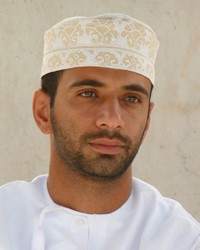Arab, Omani in United Arab Emirates

Photo Source:
CharlesFred - Flickr
Creative Commons
|
Send Joshua Project a map of this people group.
|
| People Name: | Arab, Omani |
| Country: | United Arab Emirates |
| 10/40 Window: | Yes |
| Population: | 348,000 |
| World Population: | 3,096,000 |
| Primary Language: | Arabic, Omani |
| Primary Religion: | Islam |
| Christian Adherents: | 0.00 % |
| Evangelicals: | 0.00 % |
| Scripture: | Translation Started |
| Ministry Resources: | No |
| Jesus Film: | No |
| Audio Recordings: | Yes |
| People Cluster: | Arab, Arabian |
| Affinity Bloc: | Arab World |
| Progress Level: |
|
Introduction / History
Arabs have inhabited the territory that is now Oman for thousands of years. Large numbers of Omani Arabs migrated to Zanzibar and the Swahili coast of East Africa and prospered there until a bloody revolution forced most of them to return to their homeland. Oman has a relatively strong economy and a stable government, but Omanis continue to leave to find work in other countries, including the UAE.
What Are Their Lives Like?
Omani Arabs live in extended family units of three generations. Their society is patriarchal, or male-dominated. Omani men seldom abuse this authority. They want obedience to be based on respect rather than fear. Parents usually pre-arrange marriages; they are seldom based on love. Children are considered the family's greatest asset because they provide the parents with additional laborers and social security. By age two, children are expected to begin to act like miniature adults, especially in regards to providing hospitality. Children are given gender-specific duties and there are clearly defined roles for both sexes.
Men and women often eat separately and never pray together. While men worship at mosques, women attend ceremonies conducted at home by female religious leaders.
The Omani Arabs have a reputation for being excessively generous and polite while still remaining impersonal. They view anything less as rudeness.
What Are Their Beliefs?
Omani Arabs were among the first people in the Middle East to accept Islam. They are overwhelmingly Ibadi Muslims, a branch that is similar to Sunni Islam. The Ibadis favor the selection of their imams through consensus not heritage. In that way they differ from the dominant Sunni sector of Islam. Some would describe the Ibadi sector of Islam as moderately conservative. If medical treatment fails, Omanis will seek traditional practices like exorcists and herbalists. They also look to the "cold" and "hot" properties of food to cure illnesses. There are almost no followers of Christ among the Omani Arabs.
What Are Their Needs?
The Omani Arabs need to hear and respond to Jesus Christ's claims so they can experience the abundant life He offers.
Prayer Points
Pray for persons of peace among Omani Arabs to open the door to the gospel in their communities and among their family members.
Pray for Omani Arabs in the UAE to have hearts that are open to the good news.
Pray for a massive movement to Christ among the Omani Arabs in the UAE.
Pray for Christ's ambassadors to go to them.